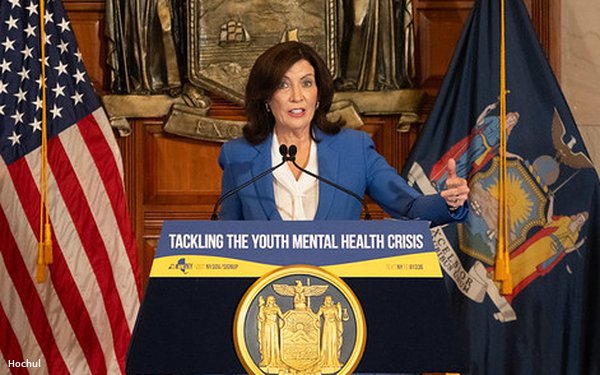
New York Governor Kathy Hochul on
Thursday signed two laws that, taken together, restrict web companies' ability to serve material to minors under 18, and to collect their data.
The Safe for Kids Act" prohibits social media platforms from using “addictive feeds” to serve content to
minors unless their parents consent. The bill also prohibits platforms from sending some notifications to minors between midnight and 6:00 a.m. without parental consent.
The measure appears to
define “addictive feeds” as feeds that serve content algorithmically, based on information associated with users or their devices.
The second law signed Thursday, the New York Child Data Protection Act, will prohibit all sites from collecting, sharing or selling personal data of anyone
under 18 without consent, unless collecting or processing data is “strictly necessary” to provide a product or service.
advertisement
advertisement
Hochul stated Thursday that the laws will address “a
mental health crisis fueled by addictive social media feeds.”
“By reining in addictive feeds and shielding kids’ personal data, we’ll provide a safer digital
environment, give parents more peace of mind, and create a brighter future for young people across New York,” she stated.
But the tech industry-funded policy organization Chamber of
Progress says the restrictions on “addictive feeds” will violate platforms' free-speech right to wield editorial control over their content.
“The creation and use of
algorithmically curated feeds are central to the editorial functions of online platforms, which are protected under the First Amendment,” Chamber of Progress senior counsel Jess Miers wrote in a
recent Medium post.
Another tech industry group, NetChoice,
suggests that banning algorithmic recommendations could backfire.
“The law will also increase children’s exposure to harmful content by requiring websites to order feeds
chronologically, prioritizing recent posts about sensitive topics,” NetChoice vice president and general counsel Carl Szabo stated Thursday.
The Chamber of Commerce raised a similar concern, arguing that a ban on algorithmic recommendations “could mean that whoever posts most recently goes to the top of a
teen’s feed -- even if that post is spam, hate speech, or other harmful content.”
The organizations also argue the bills could compromise all users' privacy, if online platforms
require everyone to verify their ages in order to comply with restrictions regarding minors.
New York isn't the only state to attempt to regulate how social platforms serve content to
teens.
Lawmakers in Arkansas, Utah, Ohio, Mississippi and California have also passed restrictions affecting teens' use of social media.
NetChoice has successfully sued to block
enforcement of the measures in California, Arkansas and Ohio.